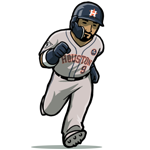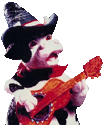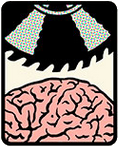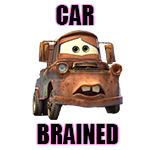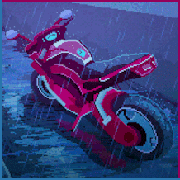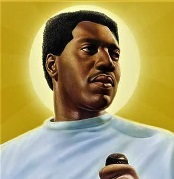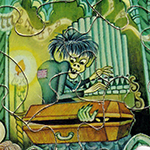|
mango sentinel posted:Was it active or passive you played? It was the active HH, so to be fair it could have been the preamp I wasn't really liking... The bass just sounded a little brittle/unrefined to me. Balance was good, feel was good, playability was good and even throughout the neck.
|
|
|
|

|
| # ? May 27, 2024 09:54 |
|
The Science Goy posted:It was the active HH, so to be fair it could have been the preamp I wasn't really liking... The bass just sounded a little brittle/unrefined to me. Balance was good, feel was good, playability was good and even throughout the neck. I'm just learning guitar and thinking of getting a bass to learn in parallel. I played around with a friend's entry level Ibanez and the neck/frets kinda felt like dogshit so feel and playability are more of what I'm looking for. Thanks!
|
|
|
|
Thanks for the advice, guys. I tried muting with the fretting fingers (used to palm mutes on guitar) and was too uncoordinated, but I'll have to drill it with some metronome practice.
|
|
|
|
When I used to play with picks, for either guitar or bass, we would use the thickest heaviest pick possible. Like a copper pick, or other metal flat picks.
|
|
|
|
Yeah picks are 100% a personal preference item but I really like the Dunlop Jazz III or the Planet Waves Black Ice. Small and thick. (much like my posting)
|
|
|
|
I think I said so recently but my pick of choice is Jim Dunlop Big Stubby 3mm. It's got zero give which I find works well on bass. With a guitar I need at least a little bit of flexibility (although I do go fairly rigid with guitar picks as well). edit: lol, I didn't realize the picture would be so big. 
Hellblazer187 fucked around with this message at 15:59 on Dec 14, 2020 |
|
|
|
I'm a huge fan of the 1mm Cool "coolcell" picks. 
|
|
|
|
Yeah, definitely something a little thicker - the pick should move the strings, not the other way round! And a bit of grippy texture helps keep it from moving around in your fingers due to the extra pushback from the thicker pick & strings. I like Dunlop Max-Grips, either 1.14 or Jazz III
|
|
|
|
I prefer stiff for sheddy guitar and flexible for chordy guitar and bass. Everyone has their own preference I guess.
|
|
|
|
Yeah sometimes it's cool to get a thin pick like a Dunlop red and just whang on that thing like flappa flappa flappa
|
|
|
|
my favorite pick ever was a promotional pick for the movie coco that was incredibly floppy and lasted maybe like 5 playing sessions before i obliterated the tip, floppy picks rule though. you can also just hold them and flip the end repeatedly, it's very soothing.
|
|
|
|
Is feedback or requesting help ok for this thread? It's bass-specific I'm trying to write a line to a song in a genre I'm not at all familiar with. In my head I hear a busy walking bass but I don't know how to accomplish that. This is the song. The demo recording with and without bass. I've got everything but the verses figured out. I made an honest attempt at it but it doesn't sound or feel right to my ear. I'm essentially just randomly going up and down scales. What kind of music or bass lines should I look to as an example? Is there any specific advice I should consider? Xander B Coolridge fucked around with this message at 22:16 on Dec 15, 2020 |
|
|
|
Quote is not edit
|
|
|
|
Sounds like youíre way overplaying it. Unless thereís going to be more drums try a take where you play only the root note of the chord on quarter notes (or maybe even down to half notes). Then listen and see where you can take out a note here or there, or maybe add a couple to help a transition. This seems like a pretty simple song so no need to clutter it up.
|
|
|
|
I'd disagree - there's a lot of space there for a nice melodic bassline - the walking bass seems a bit stiff though. Try swinging it a bit or adding syncopation. It kinda reminds me of an Australian band from the 90's: https://www.youtube.com/watch?v=QnvnNJCafgk The guitar is mostly rhythmic and the singer/drummer just plays a single snare with some minor bits of percussion. The bass player basically plays lead, kinda like a folky John Entwhisle. This might be more where you're looking to head.
|
|
|
|
Thanks both of you  I definitely want a bass part with a lot of movement. The only reason I went straight to walking bass was because the song is about the singer moving back to Texas, and it felt thematically appropriate, though I agree that what I currently farted out for the verses isn't working Thank you for the music suggestion. If anyone else has any other bands or players they can suggest to me I'd really appreciate it.
|
|
|
|
Also, have a listen to the bass for Son of a Preacher Man. It moves around a lot, but a fair bit is octaves.
|
|
|
|
Kilometers Davis posted:Functional Ear Trainer. Stick with it and I guarantee you itíll blow your mind when it starts coming together for you after some time. It uses a very good method and the app itself is well made (at least on iOS) with a responsive developer if you have any issues. Just out of curiousity how long were you using the app before you noticed any sort of benefits to your musicianship? How far along did you get? I've nearly completed the first section with the major scale (I can ace most of the exercises but I'm around 85% on the part that's random major, multiple octaves and 50 questions). Getting this far has helped in that, OK, it's proof I'm not literally tone deaf. But like, beyond that it just seems like a thing I do for 10-15 minutes a day. I also do 10-15 minutes with Complete Ear Trainer, which is more of a regular interval trainer. Again, I'm making progress inside the app but I never like, notice intervals or scale degrees when I'm actually listening to music.
|
|
|
|
the next step is to take that ear training and apply it via transcribing or moving up to chord progressions and picking out intervals and inversions. you might not notice it while just listening to music but when you actually apply your ear training it should be a lot easier than before.
|
|
|
|
I have a Zoom B3N that I use for looper and rhythm exclusively right now. Given Iím only using those two, would it make much difference if I threw it into the FX loop on my Rumble 200 amp rather than between my guitar and the amp input? The dumbest reason is that itíll save me from bending down to plug into the pedal since the amp is higher.... Yes, thatís honestly my reason. I just canít be assed to bend down if I donít have to. Iím only learning so Iím not using it for effects; Looper to try to judge how well I played something, and rhythm for obvious reasons.
|
|
|
|
You could... put the Zoom on top of the amp? Regardless of where it is in the signal chain. Or keep the cable in the Zoom input all the time and leave the instrument end on top of the amp when not using it
|
|
|
|
Hellblazer187 posted:Just out of curiousity how long were you using the app before you noticed any sort of benefits to your musicianship? How far along did you get? I've nearly completed the first section with the major scale (I can ace most of the exercises but I'm around 85% on the part that's random major, multiple octaves and 50 questions). Getting this far has helped in that, OK, it's proof I'm not literally tone deaf. But like, beyond that it just seems like a thing I do for 10-15 minutes a day. Move on to the next section. There are more notes to choose from = more challenging. Having good pitch recognition does not automatically make you a good musician unfortunately, but having a good ear is definitely a piece of the puzzle IMO.
|
|
|
|
Anyone have a glarry bass? How bout the 5 string, finna get one since they're 130 bucks.
|
|
|
|
Martytoof posted:I have a Zoom B3N that I use for looper and rhythm exclusively right now. Given I’m only using those two, would it make much difference if I threw it into the FX loop on my Rumble 200 amp rather than between my guitar and the amp input? More of as guitar issue, but placing the looper in the FX loop is actually nice because you can have different preamp settings on the loops, and whatever gain you have gets applied to each loop separately instead of in as huge muddy pile. Also the rhythm won't get hosed by whatever effects. It's a five placement. Also, the only wrong placements of any effects are a) after power amp and b) anywhere that sounds bad to you.
|
|
|
|
New books old dog.
|
|
|
|
Ooh, the one on the right looks interesting. I've been able to read treble clef easily since I was small, but I've never really been able to get bass clef to stick.
|
|
|
|
Donald Duck Dunn is such a good bassist holy poo poo, responsible for some of my fav bass lines of all time
|
|
|
|
Shageletic posted:Donald Duck Dunn is such a good bassist holy poo poo, responsible for some of my fav bass lines of all time Dunn is the reason I switched from upright to electric bass. The Blues Brothers was one of those movies that, no matter when it was on, the family would gather round and watch it every time it ran on cable. Dude was so cool! Mom was really supportive, got me into Stax. And that library gave me so much to work on.
|
|
|
|
Yeah I ordered a Jamerson book too but it's taking longer to get here. I figure between the two that's a lot of good bass lines to study. I wanna rip through the sight reading book first though and then cover up the tabs as I work through the Duck Dunn book. (I think the Jamerson book is just standard notation anyways).
|
|
|
|
Man I kind of fell off the self study train for a few weeks because work kind of got hectic. My only solace is that I still picked up the guitar every day to just noodle on something fun for like 20 or 30 minutes. Iíve managed to get simple stuff like Walking on the Moon down, and I can play through Comfortably Numb if I dumb down the bass line during the very end to its very basics. Working on Airís All I Need now and thatís coming along well enough. My biggest want right now is a good way to slow down a track without getting it to sound like absolute poo poo. Are MIDI tracks still a thing? Because I feel like that would be perfect backing material, even if it sounds like Iíve travelled back in time to 1994.
|
|
|
|
The songster app(website too) is tabs but it has a function where it will play the midi of the song. You can adjust the speed too.
|
|
|
|
Hellblazer187 posted:Yeah I ordered a Jamerson book too but it's taking longer to get here. I figure between the two that's a lot of good bass lines to study. I wanna rip through the sight reading book first though and then cover up the tabs as I work through the Duck Dunn book. (I think the Jamerson book is just standard notation anyways). Make sure when you learn the lines you pay attention to what chords they're playing on and how they play around them. Jameson did a lot of great chromatic stuff playing in and out of key that added the funk to his lines.
|
|
|
|
I was gonna say I Wish is a blast to play but realized thats actually a Nathan Watts tune.
|
|
|
|
Thumposaurus posted:The songster app(website too) is tabs but it has a function where it will play the midi of the song. I find Ultimate Guitar is worth the money. Their website & app let you display in standard notation and they have paid staff that make sure there is decent quality on popular songs. Almost everything has a bass tab. If you find errors in official tabs a comment gets it corrected in a day or two. The app also integrates with Google/Spotify to, presumably, pull up tabs for whatever song comes on. I use Amazon Music so that isn't super useful for me though. I had Songster for a bit before I realized I was paying for a web frontend for TuxGuitar with horrific quality tabs. Stuff like "Ain't No Mountain High Enough" was completely wrong for bass. I actually deleted the whole thing and uploaded a, mostly, correct bass part it was so bad. Looks like someone added drums since then. e: Thanks for the pick advice. I grabbed the Dunlop sample packs. Haven't played a ton with them since the massive regression on simple things like 'keep constant time' is annoying. FatCow fucked around with this message at 19:16 on Dec 24, 2020 |
|
|
|
Bottom Liner posted:Make sure when you learn the lines you pay attention to what chords they're playing on and how they play around them. Jameson did a lot of great chromatic stuff playing in and out of key that added the funk to his lines. So, how would you (or anyone else) recommend approaching this sort of analysis? Or is there a music theory book somewhere that might help me understand what I should be looking for here? So far with the study bass course, I've gotten through the fundamentals 1 program where's he's introduced the idea of bass lines built on roots, or roots and octaves, or roots and fifths, or flat sevenths, etc etc. I think he gets into the concept of chord tones in fundamentals 2, which I planned to take a crack at after getting better at reading standard notation. Edit: Second on ultimate guitar. Better than songsterr big time.
|
|
|
|
Hellblazer187 posted:So, how would you (or anyone else) recommend approaching this sort of analysis? Or is there a music theory book somewhere that might help me understand what I should be looking for here? Basic chord structure knowledge will tell you how the bass lines fit around the chords they're playing over, just like walking bass. Learn the basic chord structures and pick out the notes they're playing from those chords and the ones that aren't and see if they're chromatic or diatonic to the key. Here's the chord types you should have as a base: major (root, major 3rd, perfect 5th) minor (root, minor 3rd, perfect 5th) seventh (root, major 3rd, perfect 5th, major 7th) - flat 7s are also very common for the jazz sound diminished (root, minor 3rd, flat 5) augmented (root, major 3rd, sharp 5) Learn those chords/arpeggios and you'll have the foundation of 95% of the music you hear. To turn that into bass lines start playing around those arpeggios and add in the rest of the pentatonic scale in each (1/2/3/5/6) and that should carry you far.
|
|
|
|
*Italian chef finger kiss*
|
|
|
|
Here's some notation of those chord types to get you going. I left out the written notation for minor which is just Gm or g if you're a heathen. If you're using something with roman notation it's pretty simple too: capitals are major, lowercase are minor, "o" is diminished, "+" is augmented, and dominant 7th (major 3rd, minor 7th) is "o". I-V-vi-IV is the shorthand way of saying "major 1 chord of the key, then major 5th, minor 6th, major 4th". So in G that would be G, D, Em, C. The order of major key chords is I ii iii IV V vi viio I. Bottom Liner fucked around with this message at 00:33 on Dec 25, 2020 |
|
|
|
Hellblazer187 posted:So, how would you (or anyone else) recommend approaching this sort of analysis? Or is there a music theory book somewhere that might help me understand what I should be looking for here? you don't need to read music to explore chord tones; you should keep learning to read but the concept is really simple and you're pretty much there already. chord tones are just the notes that make up the fundamental chord you're playing over. for most applications, this will just be root/third/fifth. sevenths are chord tones in some idioms (jazz), but they're more dissonant, so you treat them with a little care. these are extremely consonant notes, and you generally want to keep things fairly consonant on bass (the ear perceives dissonance in lower registers more harshly, so you generally leave the spicier notes for guitarists/horn players/keyboardists who have access to the higher register.) chord tones are essentially your home base; whatever you're playing is generally governed by its relationship (consonant or dissonant) back to the underlying chord, and you can generally never go wrong playing a chord tone. you want to hit the chord tones often enough to establish the underlying harmony, especially when you play with others; it's generally your responsibility as a bassist to hit chord tones on strong beats, and you'll play them a lot on weaker beats too. pick a couple chords that make a functional progression (ii-V7-I is a great place to start); play while just hanging out on the chord tones for a while over each chord, and then add non-chord tones slowly and learn what dissonances you like. Bottom Liner posted:Basic chord structure knowledge will tell you how the bass lines fit around the chords they're playing over, just like walking bass. Learn the basic chord structures and pick out the notes they're playing from those chords and the ones that aren't and see if they're chromatic or diatonic to the key. the core of this post is right, i just want to nitpick a little bit. chords with sevenths aren't different chord types, they're still major/minor/diminished/augmented triads (just with a seventh added). dominant seventh chords come up way more frequently than just in jazz, they're fundamental to pretty much all western music (and the blues). if you just write "seventh chord", people are generally going to read that as a dominant seventh chord, not a major seventh (R/3/5/b7 instead of R/3/5/7). op probably don't need to focus on diminished and augmented chords that much early on, they're pretty rare compared to maj/min/seventh chords. i might just be not comprehending the last sentence, are you saying to play major pentatonics over all of the chord types? because that's going to be wildly dissonant for a lot of them, you generally want to play pentatonics that correspond to the underlying chord (minor pent or blues pent for minor, major pent for major, major pent for dominant sevenths although you should hit that b7 sometimes)
|
|
|
|

|
| # ? May 27, 2024 09:54 |
|
That's pretty handy. You can also play the minor thirds on the same string as the root so you don't need to stretch for the fifth, but that all depends on context. Augmented triads are interesting, because the triads work for any note in the triad. The G° up there is also B° and D#°.
|
|
|






